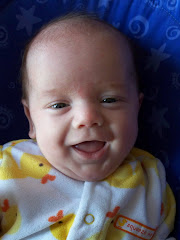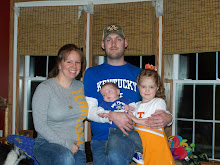Ok...so what was so bad about Obama's speech today? Personally I like when somebody encourages my child to "always do her best and to be good at what she does"...no matter if it comes from me, her dad, her grandparents, a friend, a pastor, a teacher, a homeless person, or YES...the President of the United States. In that phrase...how is that brainwashing in a negative matter? Come on people...these kids are our futures and if we teach them to be disrespectful to somebody as high as the President...what do you think they'll do to a stranger or even to us???
So his speech was telling a little about how things were when he was in school & how he was raised by his mom, how you need your education to be a doctor, nurse, teacher, etc...isn't not just handed to ya, how these kids knowledge can help fight cures, homelessness, etc, everybody has a talent, even when times are tough a "family" needs to stay together and be strong, how we make our own future, when times are tough not to just give up, setting goals, washing hands to stay healthy, how every kids out there deserves a safe environment, no one's born @ being good at things, don't be afraid to ask questions if you need help, and probably most important...don't give up on yourself.
Granted...I don't think 5th grade and under really needed to see the speech because most aren't currently working on their future goals on what they really want to be when they grow up but I think middle school and definitely high school students needed to see it. Crystal watched it...and she's 3 (well almost 4 yrs old)...she got bored like a normal child her age would and left after 10 mins...but I certainly didn't hog tie her done and tell her to watch it. In fact she said "that guy is telling me to do good when I get to go to school...so mommy...when do I get to go to school?"
So are you going to point your finger @ me and tell me I was allowing the President to "brainwash" my child...cause there are worse things out there that could be said to children. How do you think a drug addict who has a child in school feels when they hear about the county officer coming to their school and telling kids to "just say no to drugs" or an alcoholic who's kid watched a video on how drunk driving can kill? I bet those people don't like their kids seeing that...but do the schools not show it because somebody disagrees...ya...you know the answer. Some would say "but Kali...that's different"...no it's not cause that officer is telling our kids to better themselves just like the president did.
So no matter if Obama was Republic or Democrat, white, black, orange, or blue, male or female, young or old...I don't see where a little encouragement to stay in school and be the best you can be is harmful. Wonder if people would have thrown the same fit if a white homeless person had the ability to give that same speech or even if Mike Huckabee would have won and wanted to give a speech to our kids.
So...the stuff below is from msnbc.com. I normally don't read stuff like this...but since I have a child who will be in school in a couple of years I thought I'd read a little bit before I actually preached...just to get my facts straight. Enjoy and do read...it's helpful for those who are confused.
After the president’s speech to students, the White House press secretary came under questions from reporters asking about the propriety of spending taxpayers’ money to disseminate a political message to children. Political opponents in Congress even called for an investigation.
That was in 1991, and the president was George H.W. Bush. The political tempest is a reminder that presidents have regularly directed messages to the nation’s children, at least once before sparking a reaction reminiscent of the storm over President Barack Obama’s back-to-school address to students Tuesday.
When Bush spoke, the uproar was over the possibility that he might use footage of the event in political ads. Little attention was given to what Bush actually said, even though he went further than Obama did Tuesday in asking schoolchildren for their support.
That was a lesson Bush likely learned from his predecessor, President Ronald Reagan, who more than once made explicitly political appeals to students in schoolhouse settings, one of them only six months before he was up for re-election.
Bush got into trouble because he spoke on Oct. 1, 1991, at the beginning of the 1992 election cycle. Although Bush would not announce his campaign for a second term until the following February, he had already made it clear by then that he would probably run.
Against that background, Bush showed up at Alice Deal Junior High School in Washington for a speech that would be aired for students across the country by PBS and CNN. Opponents — notably Dick Gephardt of Missouri, the House Democratic leader — accused the Education Department of spending taxpayers’ money to produce “paid political advertising for the president.”
Marlin Fitzwater, the president’s spokesman, agreed that footage of the event would make for an effective campaign spot. “We certainly would use any tape of the president, doing anything, anywhere in the world at any time if it was to his political benefit,” Fitzwater said, according to The Washington Post’s account of his briefing for reporters two days afterward.
That was too much for Democrats in Congress, who ordered up an investigation by the General Accounting Office (now known as the Government Accountability Office). Two weeks later, the GAO concluded that the speech had not run afoul of limits on “the use of appropriations for publicity and propaganda.”
Bush sounds theme that got Obama in trouble. Like most of Bush’s speech 18 years ago, Obama’s address Tuesday was an innocuous reminder to kids to stay in school, with an update for these modern times — don’t spend too much time on the Internet.
What created the controversy this week was a “lesson plan” the White House distributed to teachers to help students understand the president’s message. Among the suggestions was that teachers have their students “write letters to themselves about what they can do to help the president”; that idea was dropped from revised lesson plans after some Republicans complained that the White House was trying to recruit the nation’s children to work for him.
As it happens, Bush went further than that in his 1991 speech, directly asking the nation’s students to “write me a letter — and I’m serious about this one — write me a letter about ways you can help us achieve our goals.”
“I think you know the address,” he said.
A review of news coverage from the time shows that little notice was given to the content of Bush’s call to arms, just 13 months before the general election.
Most of the time, a president’s communication to schoolchildren passes with little fanfare as just another civics lesson. For all of the controversy over Obama’s decision to bypass parents to speak directly to students in school, it was a favorite tactic for Reagan and the first President Bush.
On May 13, 1986, Reagan spoke to students at John A. Holmes High School in Edenton, N.C., by video hookup from the White House. His remarks and an ensuing question-and-answer session were piped into schools nationwide.
In his address, which came just six months before he was up for re-election, Reagan several times delivered campaign-style remarks, reporting that “we’ve been working to take an economy that was in bad shape and get it moving and growing again, take our national defense and make it first-rate again after a long period of decline, and to restore reason, respect and reality to our foreign policy.”
“And I think it’s fair to say that we’ve made a good deal of progress,” the president said.
Reagan went further, drawing a contrast with the Democrats:
“Only five years ago, our economy suffered from high inflation, high interest rates, mushrooming government spending and steadily increasing unemployment. A lot of people couldn’t find jobs, and people on fixed incomes were finding it harder to buy the basics, such as food and shelter.”
Military morale was poor, American foreign policy was not “coherent and logical,” and the Pentagon did not have a fully “realistic sense of defense needs,” he went on.
Then he told his young, largely captive audience that “we got inflation down, interest rates down, and our economy created over 1½ million new jobs just last year alone. The poor are now increasingly able to dig themselves out of poverty, and that’s been good economic news.”
“The point is that all we’ve done has had, and will continue to have, a direct impact on your lives,” Reagan said.
Reagan: Thanks to me, ‘there’s more patriotism’Two-and-a-half years later, on Nov. 14, 1988, Reagan delivered a similar message to junior high school students in the State Dining Room at the White House.
Without naming his predecessor specifically, Reagan declared in a question-and-answer session that under the administration of Democrat Jimmy Carter, “there were some things that we thought were very wrong, including the fact that there were more people unemployed, inflation was robbing the people of their earnings and their money — interest rates were high and all.”
Thanks to his administration, the president told the audience of 13-, 14- and 15-year-olds, “we have not only restored prosperity, but we have created almost 1½ million new jobs [and] added to those jobs that were already there, so that unemployment is so far down that today of all the Americans 16 years of age ... 62.7 percent of those people have jobs, are employed today.”
And to boot: “I think we have restored the belief in America’s freedom and the obligation that we have to our country. I think there’s more patriotism today.”
Besides his disputed address at Deal Junior High, the first President Bush also delivered two other, less political messages directly to schoolchildren. Both — on Sept. 12, 1989, from the library of the White House, and on Sept. 9, 1991, in a teleconference with schoolchildren during the annual National Space Science Symposium — stressed his themes that drugs are bad, studying is good and you ought to stay in shape.
None of those events — or any other presidential address or message to children — drew the same scrutiny or opposition as Obama’s address did Tuesday. That goes all the way back to 1907, when President Theodore Roosevelt sent a “Letter to the School Children of the United States” urging them to “celebrate your Arbor Day thoughtfully.”
Unlike Reagan, who was fond of reeling off strings of economic statistics to his audiences of young children, Roosevelt set out simply to explain things. “Arbor Day,” he helpfully wrote, “means simply ‘Tree Day.’”
Subscribe to:
Post Comments (Atom)






No comments:
Post a Comment